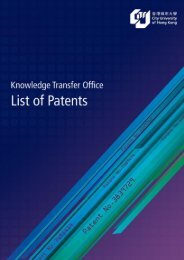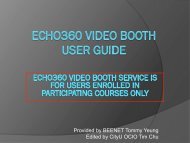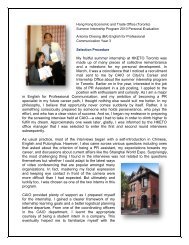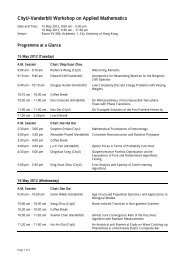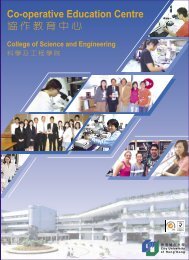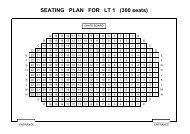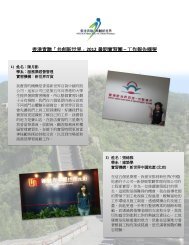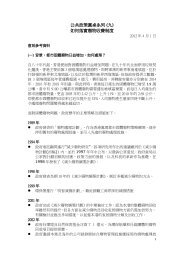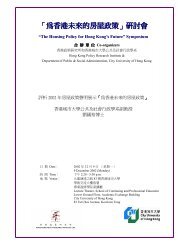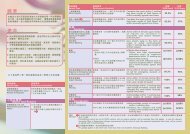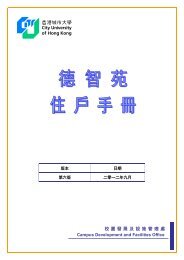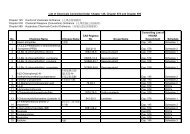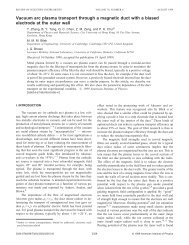Programme Handbook 2011-2012 - City University of Hong Kong
Programme Handbook 2011-2012 - City University of Hong Kong
Programme Handbook 2011-2012 - City University of Hong Kong
Create successful ePaper yourself
Turn your PDF publications into a flip-book with our unique Google optimized e-Paper software.
Mission <strong>of</strong> the Division<br />
• provide quality higher vocational education for students to meet the<br />
changing needs <strong>of</strong> the building and design industry;<br />
• enhance the learning skills and encourage the continuous<br />
development in personal potentials <strong>of</strong> students;<br />
• contribute to the advancement <strong>of</strong> knowledge in the building industry<br />
through applied research and consultancy; and<br />
• outreach to the community by servicing, interacting and co-operating<br />
with other institutions <strong>of</strong> higher education, building-related<br />
pr<strong>of</strong>essional bodies, government organizations, employers and the<br />
building industry.
CONTENTS<br />
Page<br />
1. Introduction 1<br />
2. Communication Channels Between 2<br />
Staff and Students<br />
3. <strong>Programme</strong> Entrance Requirements 6<br />
4. Description and Contents <strong>of</strong> <strong>Programme</strong> 8<br />
5. Curriculum Structure 10<br />
6. Recommended Progression Chart 14<br />
7. Courses Intended Learning Outcomes 17<br />
8. Academic Honesty 24<br />
9. Student Conduct 25<br />
10. Assessment, Progression and Award 26<br />
11. <strong>Programme</strong> Recognition 35<br />
12. Scholarships & Bursaries 36<br />
13. Staff List 38<br />
14. Academic Calendar 43
1<br />
INTRODUCTION<br />
The Division <strong>of</strong> Building Science and Technology (the “Division” or “BST”)<br />
<strong>of</strong>fers Associate Degree programmes in Architectural Studies, Building Services<br />
Engineering, Construction Engineering and Management, and Surveying (Building<br />
Surveying/Estate Surveying/Quantity Surveying). These programmes are funded<br />
by the government and have an annual intake <strong>of</strong> over 400 students.<br />
For meeting industrial needs and articulation purposes, these programmes provide<br />
a comprehensive and well-balanced education for students through quality<br />
pr<strong>of</strong>essionally oriented curriculum integrated with broad-based knowledge and<br />
generic, transferable skills for life-long learning. The associate degrees awarded<br />
are recognized by the relevant pr<strong>of</strong>essional institutions.<br />
The Division is supported by a team <strong>of</strong> well-qualified, multi-disciplinary academic<br />
staff with expertise in all aspects <strong>of</strong> the building construction industry. The Design<br />
Studios and Computer Studios within the Division, which are equipped with state<strong>of</strong>-the-art<br />
hardware, s<strong>of</strong>tware and other facilities, provide a stimulating<br />
environment for maximizing students' learning.<br />
AScBSE <strong>Programme</strong> <strong>Handbook</strong> <strong>2011</strong>-12 1
2<br />
COMMUNICATION<br />
CHANNELS BETWEEN<br />
STAFF & STUDENTS<br />
2.1 Procedure<br />
Students who have any academic difficulties with a course should speak<br />
directly to the lecturer responsible for that course.<br />
A student wishing to discuss the organisation <strong>of</strong> the programme should<br />
speak to the <strong>Programme</strong> Leader.<br />
A student who has general academic problems should also speak to the<br />
Year Tutor or <strong>Programme</strong> Leader. In appropriate circumstances, the<br />
<strong>Programme</strong> Leader may refer the student to a Student Counsellor <strong>of</strong> the<br />
Student Development Services.<br />
If none <strong>of</strong> the above channels are appropriate or satisfactory, an interview<br />
with the Head <strong>of</strong> Division may be requested.<br />
A formal consultative process between students and staff exists in the<br />
Division in the form <strong>of</strong> a Joint Staff/Student Consultative Committee.<br />
A formal communication channel between students and staff exists in the<br />
Division in the form <strong>of</strong> <strong>Programme</strong> Committee for which students from our<br />
programme <strong>of</strong> each year can elect one representative to be a member.<br />
2.2 Joint Staff/Student Consultative Committee<br />
General<br />
The Joint Staff/Student Consultative Committee is a formal part <strong>of</strong> the<br />
consultative process between students and staff in the Division but<br />
meetings are conducted in an informal manner. The purpose <strong>of</strong> the<br />
Committee is to provide students with an opportunity to express their<br />
views on the content and organisation <strong>of</strong> the programme and to make<br />
suggestions <strong>of</strong> a general nature.<br />
2 Division <strong>of</strong> Building Science & Technology
Constitution<br />
A. The membership shall comprise the following :<br />
(a)<br />
(b)<br />
(c)<br />
The <strong>Programme</strong> Leader (Chairman);<br />
Two academic staff members <strong>of</strong> the programme team;<br />
One student member for each year.<br />
B. Students in each year shall nominate a student member in a fair way<br />
as possible. The Year Tutor is available to assist in the conducting <strong>of</strong><br />
elections or obtaining volunteers.<br />
C. The Joint Staff/Student Consultative Committee will normally meet<br />
once per Semester. Additional meetings may be organised at the<br />
Chairman's discretion.<br />
D. There will be no formal agenda or minutes. However, if major issues<br />
are to be raised, it may be helpful if these items are circulated in<br />
advance. The Chairman will ensure that a note is taken <strong>of</strong> the main<br />
issues raised.<br />
E. The meetings will be consultative in nature only and are not<br />
empowered to make binding decisions. Discussions will thus be<br />
confined to general academic and programme organisational matters.<br />
2.3 <strong>Programme</strong> Committee<br />
Terms <strong>of</strong> Reference<br />
Within the policies and procedures <strong>of</strong> the Senate and the College Board,<br />
the <strong>Programme</strong> Committee shall be responsible to the College Board for:<br />
1. The maintenance <strong>of</strong> the quality <strong>of</strong> the programme to ensure the<br />
attainment <strong>of</strong> its aims and objectives, including :<br />
(a) systematic monitoring and evaluation <strong>of</strong> the programme;<br />
(b) the review <strong>of</strong> examination results <strong>of</strong> the programme;<br />
(c) consideration <strong>of</strong> external academic advisor’s reports on the<br />
programme and monitoring <strong>of</strong> any consequential action;<br />
AScBSE <strong>Programme</strong> <strong>Handbook</strong> <strong>2011</strong>-12 3
(d) the development <strong>of</strong> the programme and modifications to it;<br />
(e) the consideration <strong>of</strong> student feedback on the programme.<br />
2. The development <strong>of</strong> policy to meet the needs <strong>of</strong> the programme in<br />
relation to :<br />
(a) the recruitment and selection <strong>of</strong> students;<br />
(b) assessment;<br />
(c) teaching and learning methods.<br />
3. Recommending the appointment <strong>of</strong> proposed external academic<br />
advisor(s).<br />
4. Preparation <strong>of</strong> reports as required by the College Board or the Senate,<br />
including the submission <strong>of</strong> an annual report on the programme to the<br />
Head <strong>of</strong> Division each year.<br />
Constitution<br />
Ex-<strong>of</strong>ficio Members :<br />
The <strong>Programme</strong> Leader (Chairman)<br />
Such staff with specified responsibilities for the programme as<br />
determined by the Head <strong>of</strong> Division<br />
Nominated Members :<br />
At least one academic staff member from each subject area covered in<br />
the programme and taught by the Division responsible for the<br />
programme, appointed by the Head <strong>of</strong> Division.<br />
One member <strong>of</strong> the academic staff <strong>of</strong> each <strong>of</strong> other Divisions or<br />
Departments contributing to the teaching <strong>of</strong> the programme, appointed<br />
by the Head <strong>of</strong> each servicing Division or Department.<br />
4 Division <strong>of</strong> Building Science & Technology
Elected Members :<br />
Two students from each year <strong>of</strong> the programme, elected by and from<br />
the students studying on each year <strong>of</strong> the programme.<br />
Co-opted Members :<br />
No more than two co-opted members.<br />
The terms <strong>of</strong> <strong>of</strong>fice <strong>of</strong> all nominated, elected and co-opted members<br />
shall be one year.<br />
AScBSE <strong>Programme</strong> <strong>Handbook</strong> <strong>2011</strong>-12 5
3<br />
PROGRAMME<br />
ENTRANCE<br />
REQUIREMENTS<br />
To be eligible for admission, an applicant must satisfy the minimum General<br />
Entrance Requirements for Associate Degree programmes and the <strong>Programme</strong><br />
Specific Entrance Requirements, as follows:<br />
3.1 General Entrance Requirements<br />
3.1.1 <strong>Hong</strong> <strong>Kong</strong> Advanced Level Examination (HKALE) Entry<br />
i. grade E or above in one A-level subject or grade E or above in<br />
two AS-level subjects, which may include Use <strong>of</strong> English and<br />
Chinese Language & Culture; and<br />
ii.<br />
grade E or above in five HKCEE subjects, which may include<br />
English Language or Chinese Language; and<br />
iii. satisfy the English Language Requirement for Associate Degree<br />
programmes:<br />
E in HKCEE English Language (syllabus B); or<br />
C in HKCEE English Language (syllabus A); or<br />
Level 2 in HKCEE English Language (for results obtained<br />
in 2007 and after); or<br />
E in HKALE AS Use <strong>of</strong> English or equivalent<br />
iv. satisfy the Chinese Language or Alternative Language<br />
Requirement for Associate Degree programmes<br />
E in HKCEE Chinese Language; or<br />
Level 2 in HKCEE Chinese Language (for results obtained<br />
in 2007 and after); or<br />
E in HKALE AS Chinese Language and Culture or<br />
equivalent<br />
6 Division <strong>of</strong> Building Science & Technology
3.1.2 Other Qualifications Entry<br />
Other qualification may include an academic qualification from a<br />
local post-secondary institution or a pr<strong>of</strong>essional qualification<br />
acceptable to the <strong>University</strong>. Qualifications attained by study at a<br />
local international school, or non-local high school, at Grade 12 or<br />
equivalent, are also accepted as satisfying the General Entrance<br />
Requirements.<br />
Applicants whose entrance qualification is obtained in a language<br />
other than English will need an acceptable result in an approved<br />
English language qualification such as:<br />
TOEFL – score <strong>of</strong> 550 (paper-based test) or 213 (computer-based<br />
test) or 79 (internet-based test)<br />
IELTS – overall band score <strong>of</strong> 6<br />
3.1.3 Mature Applicant<br />
be a "mature applicant" <strong>of</strong> at least 25 years <strong>of</strong> age on 1 September<br />
immediately prior to admission, and have a demonstrated capacity to<br />
pursue the programme applied for.<br />
3.2 <strong>Programme</strong> Specific Entrance Requirements - satisfy one <strong>of</strong> the following:<br />
i. E in 1 HKALE subject, including Applied Maths, Biology,<br />
Chemistry, Computer Studies, Engineering Science, Physics or Pure<br />
Maths; or E in 2 HKALE AS subjects, including Applied Maths,<br />
Biology, Chemistry, Computer Applications, Maths & Statistics,<br />
Physics or Design & Technology; and E in 5 HKCEE subjects.<br />
ii.<br />
Hold a recognized diploma in mechanical, electrical or building<br />
services engineering or other related subject and satisfy the English<br />
Language requirement and Chinese Language Requirement for<br />
Associate Degree <strong>Programme</strong>.<br />
AScBSE <strong>Programme</strong> <strong>Handbook</strong> <strong>2011</strong>-12 7
4<br />
DESCRIPTION AND<br />
CONTENTS OF<br />
PROGRAMME<br />
4.1 General<br />
The Associate <strong>of</strong> Science in Building Services Engineering is constituted<br />
from a range <strong>of</strong> courses which combine formal lectures, tutorials,<br />
laboratories, workshops and practical courseworks.<br />
It is stressed that coursework is an important feature <strong>of</strong> some courses and<br />
provides a medium through which students’ understanding <strong>of</strong> the<br />
interrelated aspects <strong>of</strong> building services design, production and<br />
performance can be developed and assessed.<br />
4.2 <strong>Programme</strong> aims & Intended Learning Outcomes<br />
<strong>Programme</strong> aims<br />
The Associate <strong>of</strong> Science in Building Services Engineering aims to<br />
produce graduates to possess<br />
1. content-based knowledge and practical skills related to building<br />
services engineering pr<strong>of</strong>essionals to enable them to work as a<br />
competent associate pr<strong>of</strong>essional in the construction and real estate<br />
industry; and<br />
2. intellectual abilities and transferable skills to communicate<br />
effectively, analyse information critically, solve problems<br />
independently, through acquiring generic skills for language, IT,<br />
interpersonal, teamwork, self-management and life-long learning.<br />
The graduates are expected to have a broad-based academic foundation and<br />
practical skills in building services engineering to enter into an<br />
international workplace or continuing education in local and overseas<br />
universities.<br />
8 Division <strong>of</strong> Building Science & Technology
<strong>Programme</strong> Intended Learning Outcomes (PILOs):<br />
Upon successful completion <strong>of</strong> this programme, students should be able to:<br />
Subject Specific Knowledge<br />
1. consider environmental and energy conservation issues related to<br />
building services systems.<br />
2. apply information technology for building services engineering<br />
design production and communication.<br />
3. utilise standard computer-aided design s<strong>of</strong>tware for carrying out<br />
building services system design.<br />
4. explain health and safety procedures related to building services<br />
engineering.<br />
Practical Pr<strong>of</strong>essional Skills<br />
1. undertake basic design, installation and commissioning <strong>of</strong> typical<br />
heating, ventilation, and air-conditioning systems.<br />
2. undertake basic design, installation and commissioning <strong>of</strong> typical<br />
electrical power distribution systems, vertical transportation systems<br />
and extra low-voltage systems.<br />
3. undertake basic design, installation and commissioning <strong>of</strong> typical<br />
plumbing and drainage systems.<br />
4. undertake basic design, installation and commissioning <strong>of</strong> typical<br />
fire services systems.<br />
Intellectual and Transferable Skills<br />
1. demonstrate an understanding <strong>of</strong> moral and ethical responsibility in<br />
engineering pr<strong>of</strong>ession.<br />
2. demonstrate the ability to think critically and to solve problems<br />
independently.<br />
3. demonstrate interpersonal skills, effective oral and written<br />
communication skills relating to the building services industry in a<br />
more international workplace.<br />
4. develop abilities and commitment to continuing pr<strong>of</strong>essional<br />
learning and self-development.<br />
AScBSE <strong>Programme</strong> <strong>Handbook</strong> <strong>2011</strong>-12 9
5<br />
CURRICULUM<br />
STRUCTURE<br />
5.1 Mode <strong>of</strong> Attendance<br />
Full-time – student taking 12 to 18 credits per semester<br />
5.2 Curriculum Structure<br />
In the Credit Unit System, the curriculum structure includes a series <strong>of</strong><br />
courses that cover the following aspects:<br />
1. <strong>University</strong> requirements<br />
2. <strong>Programme</strong> core courses<br />
For the Associate <strong>of</strong> Science in Building Services Engineering, students are<br />
required to accumulate a minimum <strong>of</strong> 79 credits, including 6 credits <strong>of</strong><br />
Out-<strong>of</strong>-Discipline requirements, 6 credits <strong>of</strong> language requirements and 67<br />
credits <strong>of</strong> programme core.<br />
These courses are listed in the ensuing pages for information.<br />
10 Division <strong>of</strong> Building Science & Technology
1. <strong>University</strong> Requirements: (12 credits)<br />
• Chinese Civilization Courses (3 credits)<br />
Course Code Course Title Credit Units<br />
GE1501 Chinese Civilization – History and Philosophy 3<br />
• Language Requirement (6 credits)<br />
• For students who have obtained a grade below E in HKALE AS Use <strong>of</strong><br />
English (or equivalent):<br />
Course Code Course Title Credit Units<br />
EL0009 EAP Foundation Course -<br />
EL0200 English for Academic Purposes (EAP) 6<br />
• For students who have obtained Grade E in HKALE AS Use <strong>of</strong> English (or<br />
equivalent):<br />
Course Code Course Title Credit Units<br />
EL0200 English for Academic Purposes (EAP) 6<br />
• For students who have obtained grade D in HKALE AS Use <strong>of</strong> English (or<br />
equivalent):<br />
Course Code Course Title Credit Units<br />
EN3241 Technical Communication 3<br />
EN or CTL<br />
Any English or Chinese language courses from<br />
the list <strong>of</strong> EN and CTL courses approved by<br />
Senate for fulfilling the <strong>University</strong> Language<br />
Requirements<br />
3<br />
AScBSE <strong>Programme</strong> <strong>Handbook</strong> <strong>2011</strong>-12 11
• For students who have obtained Grade C or above in HKALE AS Use <strong>of</strong><br />
English (or Equivalent):<br />
Course Code Course Title Credit Units<br />
EN3241 Technical Communication 3<br />
EN or CTL<br />
Any English or Chinese or third language<br />
courses from the list <strong>of</strong> EN and CTL courses<br />
approved by Senate for fulfilling the <strong>University</strong><br />
Language Requirements<br />
3<br />
• Out-<strong>of</strong>-Discipline Requirement (3 Credits)<br />
• Students have to take at least 3 credit units <strong>of</strong> GE to fulfil the Out-<strong>of</strong>-<br />
Discipline requirement.<br />
GE courses <strong>of</strong>fered by BST in <strong>2011</strong>/12 for Associate Degree students:<br />
Course Code Course Title Credit Units<br />
GE1303 Urban Life and Development 3<br />
GE1304 Visual Expression and Communication 3<br />
GE1307 Appreciation <strong>of</strong> Built Heritage 3<br />
GE2110<br />
Experiencing our Built Environment:<br />
Appreciation <strong>of</strong> Contemporary Architecture<br />
3<br />
GE2311 Technology and Society 3<br />
GE2314<br />
Construction as one <strong>of</strong> the Founding Stones <strong>of</strong><br />
Modern <strong>Hong</strong> <strong>Kong</strong><br />
3<br />
Other GE courses information is available at EDGE website:<br />
www.cityu.edu.hk/edge/ge/<br />
12 Division <strong>of</strong> Building Science & Technology
2. <strong>Programme</strong> Core Courses: (67 credits)<br />
Course<br />
Code<br />
Course Title<br />
Level<br />
Units<br />
Worth<br />
BST11411<br />
Building Technology for BSE<br />
Students<br />
A1 3<br />
BST11511 Thermodynamics A1 3<br />
BST11512 Fluid Mechanics A1 3<br />
BST11513 Electrical Science A1 3<br />
MA0101 Basic Engineering Mathematics I A1 3<br />
BST11524 Building Environmental Science A1 4<br />
BST11571 Building Services Laboratory 1 A1 2<br />
BST21422<br />
Building Services Project<br />
Management and Administration<br />
A2 3<br />
MA0102 Basic Engineering Mathematics II A2 3<br />
BST21531 HVAC Services 1 A2 3<br />
BST21532 HVAC Services 2 A2 3<br />
BST21541 Piped Services A2 3<br />
BST21542 Fire Services A2 3<br />
BST21551 Electrical Services 1 A2 3<br />
BST21552 Electrical Services 2 A2 3<br />
BST21553 Electrical & Electronic Systems A2 3<br />
BST21572 Building Services Laboratory 2 A2 2<br />
BST21582<br />
Commissioning, Maintenance &<br />
Management<br />
A2 3<br />
BST21583 Integrated Project A2 8<br />
BST11591 Engineering Practical Training 1 A1 2<br />
BST21592 Engineering Practical Training 2 A2 4<br />
Total credit units:<br />
= <strong>University</strong> Requirements (12 credits) + <strong>Programme</strong> Core Courses (67<br />
credits)<br />
= 79 credits<br />
AScBSE <strong>Programme</strong> <strong>Handbook</strong> <strong>2011</strong>-12 13
6<br />
RECOMMENDED<br />
PROGRESSION CHART<br />
The recommended progression charts are shown for reference. Please note that<br />
the arrangement <strong>of</strong> courses in this chart is for recommendation purpose, and<br />
students can use them as a reference to select courses in each semester throughout<br />
the programme period.<br />
14 Division <strong>of</strong> Building Science & Technology
AScBSE <strong>Programme</strong> <strong>Handbook</strong> <strong>2011</strong>-12 15<br />
Recommended Progression Chart (First Year)<br />
Semester A<br />
Credit<br />
Units<br />
Semester B<br />
Credit<br />
Units<br />
Summer<br />
Term<br />
Credit<br />
Units<br />
BST11511 Thermodynamics 3 BST21531 HVAC Services 1 3 BST21592 Engineering Practical Training 2 3<br />
BST11513 Electrical Science 3 BST21551 Electrical Services 1 3 General Education Course /<br />
Chinese Civilization Course 2,3 3<br />
MA0101 Basic Engineering Mathematics I 3 BST21542 Fire Services 3<br />
BST11512 Fluid Mechanics 3 BST21541 Piped Services 3<br />
BST11524 Building Environmental Science 4 BST21552 Electrical Services 2 3<br />
BST11591 Engineering Practical Training 1 2 BST21592 Engineering Practical Training 2 1<br />
General Education Course / Chinese 3 BST11571 Building Services Laboratory 1 2<br />
Civilization Course 1<br />
Other language course 3 3 EN3241 Technical Communication/<br />
Other language course 3 3<br />
EL0009 EAP Foundation Course 1 - EL0200 English for Academic Purposes (EAP) 1 6*<br />
EL0200 English for Academic Purposes (EAP) 2 6*<br />
21 CUS 21 CUS 6 CUS<br />
1 For students who have obtained a grade below E in HKALE AS Use <strong>of</strong> English (or equivalent)<br />
2 For students who have obtained Grade E in HKALE AS Use <strong>of</strong> English (or equivalent)<br />
3 For students who have obtained Grade D or above in HKALE AS Use <strong>of</strong> English (or equivalent)<br />
* Workload for these 6 credits is distributed over Semester A and B or Semester B and Summer
16 Division <strong>of</strong> Building Science and Technology<br />
Recommended Progression Chart (Second Year)<br />
Semester A<br />
Credit<br />
Units<br />
Semester B<br />
Credit<br />
Units<br />
BST21532 HVAC Services 2 3 BST21572 Building Services Laboratory 2 2<br />
BST21553 Electrical & Electronic Systems 3 BST21422<br />
Building Services Project Management and<br />
Administration<br />
3<br />
BST21583 Integrated Project 4 BST21583 Integrated Project 4<br />
MA0102 Basic Engineering Mathematics II 3 BST21582 Commissioning, Maintenance & Management 3<br />
BST11411<br />
Building Technology for BSE<br />
Students<br />
3<br />
General Education Course / Chinese<br />
Civilization Course 1,2,3 3<br />
19 CUS 12 CUS<br />
1 For students who have obtained a grade below E in HKALE AS Use <strong>of</strong> English (or equivalent)<br />
2 For students who have obtained Grade E in HKALE AS Use <strong>of</strong> English (or equivalent)<br />
3 For students who have obtained Grade D or above in HKALE AS Use <strong>of</strong> English (or equivalent)
7<br />
COURSES INTENDED<br />
LEARNING OUTCOMES<br />
Upon successful completion <strong>of</strong> the following courses, students should be able to:<br />
BST11411 Building Technology for BSE Students<br />
1. identify the functional performance requirements for building elements and<br />
systems <strong>of</strong> selected building types.<br />
2. explain the nature <strong>of</strong> building industry and the various types <strong>of</strong> building and<br />
development processes and the key participants involved.<br />
3. state the impact <strong>of</strong> major building and development controls on building<br />
services considerations.<br />
4. describe the considerations and coordination <strong>of</strong> building services systems<br />
with building works.<br />
5. describe the materials, principles and methods <strong>of</strong> construction <strong>of</strong> different<br />
building elements and systems.<br />
BST11511 Thermodynamics<br />
1. solve problems related to fundamental laws in classical thermodynamics.<br />
2. use saturated and superheated steam tables.<br />
3. analyse simple thermodynamic and psychometric processes.<br />
4. analyse simple thermodynamic cycles.<br />
BST11512 Fluid Mechanics<br />
1. solve basic problems <strong>of</strong> fluid statics.<br />
2. solve problems <strong>of</strong> the fundamental principles <strong>of</strong> fluid flow.<br />
3. apply principles <strong>of</strong> fluid flow in pipe flow and external flow in the context <strong>of</strong><br />
building services engineering.<br />
4. predict relationship <strong>of</strong> parameters <strong>of</strong> fluid flow by similarity and dimensional<br />
analysis.<br />
AScBSE <strong>Programme</strong> <strong>Handbook</strong> <strong>2011</strong>-12 17
BST11513 Electrical Science<br />
1. identify the suitable electrical measuring instruments for measuring electrical<br />
quantities.<br />
2. describe the properties <strong>of</strong> electromagnetic circuits.<br />
3. explain the properties <strong>of</strong> basic electrical components and their interrelationships<br />
in D.C. circuits and A.C. circuits.<br />
4. analyse electric circuits by network theorems.<br />
5. analyse the performance <strong>of</strong> A.C. electrical power supply and distribution<br />
systems by phasor approach.<br />
BST11524 Building Environmental Science<br />
1. describe the purposes and working principle <strong>of</strong> ventilation.<br />
2. analyse practical problems <strong>of</strong> indoor air quality in the built environment.<br />
3. analyse practical problems <strong>of</strong> heat in the built environment.<br />
4. analyse practical problems <strong>of</strong> light in the built environment.<br />
5. analyse practical problems <strong>of</strong> sound in the built environment.<br />
BST11571 Building Services Laboratory 1<br />
1. describe the practical procedures to perform experiments.<br />
2. apply analytical techniques in the measurement and testing <strong>of</strong> building<br />
services components/systems.<br />
3. predict the performance <strong>of</strong> building services components/systems by related<br />
theories and principles.<br />
4. communicate the results and observations in the form <strong>of</strong> log sheets during the<br />
experiment.<br />
5. contrast the experimental results with the theoretical interpretations.<br />
BST11591 Engineering Practical Training 1<br />
1. describe technological developments on equipment, materials and work<br />
methods.<br />
2. undertake practical training on major building services systems and<br />
components.<br />
3. explain engineering practice and health & safety issues in the workplace.<br />
BST21422 Building Services Project Management and Administration<br />
1. identify the basic components in contract, contractual obligations and rights<br />
<strong>of</strong> contracting parties in construction projects.<br />
2. identify procurement methods and procedures for building services projects.<br />
3. apply quantitative techniques to prepare work programmes, budgets and<br />
18 Division <strong>of</strong> Building Science and Technology
cashflow forecasts.<br />
4. outline the principles management functions related to material management,<br />
design <strong>of</strong> organizational structure and project information management.<br />
5. apply the requirements <strong>of</strong> safety and quality assurance.<br />
BST21531 HVAC Services 1<br />
1. explain the working principles <strong>of</strong> mechanical ventilation and air distribution<br />
systems, their equipment constructions and operation characteristics.<br />
2. explain the working principles <strong>of</strong> single- and multi-zone air-conditioning<br />
systems, their equipment constructions and operation characteristics.<br />
3. perform flow analysis <strong>of</strong> fan-duct systems with diagrams and graphs.<br />
4. perform air-conditioning cycle analysis <strong>of</strong> single-zone air-conditioning<br />
systems with diagrams and psychromatric chart.<br />
5. perform air-conditioning cycle analysis <strong>of</strong> common multi-zone airconditioning<br />
systems with diagrams and psychromatric chart.<br />
BST21532 HVAC Services 2<br />
1. explain in relation to scientific principles the construction, operating principle<br />
and pros & cons <strong>of</strong> different refrigeration systems.<br />
2. apply the knowledge <strong>of</strong> therm<strong>of</strong>luid and air-conditioning engineering in<br />
analyzing the performance <strong>of</strong> common refrigeration systems.<br />
3. explain in relation to scientific principles the construction, operating principle<br />
and pros & cons <strong>of</strong> different hydronic, heat rejection, and space heating<br />
systems, including the system control methods.<br />
4. apply the knowledge <strong>of</strong> therm<strong>of</strong>luid and air-conditioning engineering in<br />
analyzing the performance <strong>of</strong> common hydronic, heat rejection, and space<br />
heating systems.<br />
5. select the appropriate central plant systems, components and control<br />
techniques for building applications, from the operation characteristics and<br />
energy efficiency perspective.<br />
BST21541 Piped Services<br />
1. apply basic principles, pipe sizing calculations, relevant standards and<br />
legislative requirements to the design and installation <strong>of</strong> cold water supply<br />
systems with due consideration to energy and saving.<br />
2. apply basic principles, pipe sizing calculations, relevant standards and<br />
legislative requirements to the design and installation <strong>of</strong> hot water supply<br />
systems with due consideration to energy and saving.<br />
3. apply basic principles, pipe sizing calculations, relevant standards and<br />
legislative requirements to the design and installation <strong>of</strong> flushing water supply<br />
AScBSE <strong>Programme</strong> <strong>Handbook</strong> <strong>2011</strong>-12 19
systems with due consideration to energy and saving.<br />
4. apply basic principles, pipe sizing calculations, relevant standards and<br />
legislative requirements to the design and installation <strong>of</strong> above ground<br />
drainage systems.<br />
5. apply basic principles, pipe sizing calculations, relevant standards and<br />
legislative requirements to the design and installation <strong>of</strong> underground<br />
drainage systems with due consideration to energy and saving.<br />
BST21542 Fire Services<br />
1. explain the properties and classification <strong>of</strong> fire.<br />
2. explain working principles <strong>of</strong> automatic fire alarm and detection system and<br />
installation.<br />
3. explain working principles <strong>of</strong> fixed gas system and foam system and<br />
installation in terms <strong>of</strong> smothering extinguishing method.<br />
4. explain working principles <strong>of</strong> fire hydrant/hose reel system, sprinkler system<br />
and installation in terms <strong>of</strong> cooling extinguishing method.<br />
5. explain working principles <strong>of</strong> smoke control system and installation for<br />
smoke ventilation.<br />
6. select suitable fire protection systems and installation for various types <strong>of</strong><br />
building fire in accordance with fire properties, fire classification, local<br />
regulations and the relevant standards.<br />
BST21551 Electrical Services 1<br />
1. identify the characteristics <strong>of</strong> and user requirements for electricity services.<br />
2. explain the local electricity ordinance and codes <strong>of</strong> practice, and international<br />
standards governing the installation <strong>of</strong> building electrical power distribution<br />
systems.<br />
3. analyse the operating performance <strong>of</strong> transformers and motors.<br />
4. apply electrical principles and theories to the design and operation <strong>of</strong><br />
electrical components in building electrical power distribution systems.<br />
BST21552 Electrical Services 2<br />
1. apply measures to protect buildings against lightning strikes.<br />
2. identify factors for the selection and erection <strong>of</strong> electrical wiring systems.<br />
3. relate the relevant codes, standards and regulations for energy efficient design<br />
and operation <strong>of</strong> electrical power distribution system.<br />
4. design a reliable, safe and energy efficient electrical wiring system.<br />
5. select appropriate emergency power supply systems for buildings.<br />
20 Division <strong>of</strong> Building Science and Technology
BST21553 Electrical & Electronic Systems<br />
1. design a reliable, safe and energy efficient vertical transportation system in<br />
accordance with relevant principles and standards.<br />
2. design an energy efficient lighting system in accordance with relevant<br />
principles and standards.<br />
3. explain factors in the selection and erection <strong>of</strong> the communication system.<br />
4. explain factors in the selection and erection <strong>of</strong> the security system.<br />
BST21572 Building Services Laboratory 2<br />
1. describe the practical procedures to perform experiments.<br />
2. apply analytical techniques in the measurement and testing <strong>of</strong> building<br />
services components/systems.<br />
3. predict the performance <strong>of</strong> building services components/systems by related<br />
theories and principles.<br />
4. communicate the results and observations in the form <strong>of</strong> log sheets during the<br />
experiment.<br />
5. contrast the experimental results with the theoretical interpretations.<br />
BST21582 Commissioning, Maintenance and Management<br />
1. recognise pr<strong>of</strong>essional ethics and the inter-relationship <strong>of</strong> design, installation,<br />
commissioning, operation, and maintenance processes <strong>of</strong> building services<br />
systems.<br />
2. explain the importance <strong>of</strong> strategic planning in testing, commissioning and<br />
maintenance <strong>of</strong> building services systems and equipment in relation to health<br />
& safety, codes <strong>of</strong> practice and statutory requirements.<br />
3. outline commissioning and testing procedures on major mechanical services<br />
systems and equipment.<br />
4. outline commissioning and testing procedures on major electrical services and<br />
control systems and equipment.<br />
5. outline maintenance procedures on major building services systems and<br />
equipment.<br />
6. describe alternative energy conservation measures in terms <strong>of</strong> energy<br />
management, energy codes and cost assessment.<br />
BST21583 Integrated Project<br />
1. identify the client requirements, architectural and structural features, site<br />
environment, local design practice and regulations, and related design<br />
information.<br />
2. contrast the design alternatives for an appropriate design solution.<br />
3. discuss the design consideration and solution through appropriate design<br />
AScBSE <strong>Programme</strong> <strong>Handbook</strong> <strong>2011</strong>-12 21
calculation and equipment specification.<br />
4. communicate the design calculations, considerations and solutions through<br />
pr<strong>of</strong>essional report, drawings, presentation and critique.<br />
5. coordinate building services systems, architectural and structural features as<br />
an integrated design.<br />
6. implement the techniques <strong>of</strong> building services design process.<br />
BST21592 Engineering Practical Training 2<br />
1. apply the computer-aided drafting skills to produce building services<br />
drawings for design communication and presentation.<br />
2. design building services systems according to relevant design criteria.<br />
3. develop engineering solutions by using computer s<strong>of</strong>tware.<br />
4. explain installation requirements <strong>of</strong> major building services equipment.<br />
5. apply the field measurement techniques to assess the performances <strong>of</strong><br />
building services installations.<br />
6. recognize the role and ethics <strong>of</strong> engineering pr<strong>of</strong>ession.<br />
MA0101 Basic Engineering Mathematics I<br />
1. manipulate expressions and equations involving complex numbers.<br />
2. implement basic operations in vector algebra, dot and cross products.<br />
3. perform techniques <strong>of</strong> differentiation to obtain derivatives and Taylor series<br />
expansions <strong>of</strong> functions.<br />
4. perform techniques <strong>of</strong> integration to evaluate integrals <strong>of</strong> functions.<br />
5. apply methods <strong>of</strong> differential and integral calculus to a range <strong>of</strong> geometrical<br />
and engineering problems.<br />
MA0102 Basic Engineering Mathematics II<br />
1. perform basic operations <strong>of</strong> matrix arithmetic and techniques for solving<br />
systems <strong>of</strong> linear equations.<br />
2. solve first-order linear and special types <strong>of</strong> non-linear ordinary differential<br />
equations.<br />
3. solve second-order linear differential equations with constant coefficients.<br />
4. implement techniques in Laplace transforms and Fourier series.<br />
5. apply mathematical and computational methods to a range <strong>of</strong> problems in<br />
science and engineering.<br />
22 Division <strong>of</strong> Building Science and Technology
GE1501 Chinese Civilisation - History and Philosophy<br />
1. illustrate key events and the three central themes in Chinese history and<br />
philosophy.<br />
2. demonstrate fundamental knowledge <strong>of</strong> relevant Chinese historical and<br />
documentary sources.<br />
3. examine critically the overall historical themes and philosophical concepts<br />
and assess ancient source materials through reading assignment and tutorial<br />
discussion.<br />
4. apply historical and philosophical knowledge, wisdom and perspectives to<br />
criticize current issues.<br />
5. identify the self in the modern world.<br />
EL0009 EAP Foundation Course<br />
1. demonstrate an appropriate reading ability at CEFR level B1+ to interpret the<br />
content <strong>of</strong> a range <strong>of</strong> authentic texts in a university setting.<br />
2. communicate their understanding <strong>of</strong> reading texts in a reading group.<br />
3. recognise a range <strong>of</strong> lexical and grammatical structures and syntax, and text<br />
types.<br />
4. write short texts to express their intended meaning at CEFR level B1+.<br />
EL0200 English for Academic Purposes<br />
1. write coherent academic texts using lexico-grammatical choices appropriate<br />
to the task at CEFR level B2+.<br />
2. accurately summarize in writing the ideas <strong>of</strong> others.<br />
3. demonstrate an appropriate reading ability at CEFR level B2+ to<br />
comprehend, analyse, synthesise and evaluate authentic texts in academic<br />
settings.<br />
4. recognize and interpret the discourse patterns and lexico-grammatical choices<br />
in academic texts.<br />
5. select and appropriately integrate relevant information from other sources<br />
into written texts.<br />
EN3241 Technical Communication<br />
1. identify the structure and language characteristics in pr<strong>of</strong>essional writing and<br />
apply them to an in-class mid-term quiz.<br />
2. identify the structure and language characteristics <strong>of</strong> a formal trip report and<br />
apply them to the writing <strong>of</strong> a formal report.<br />
3. plan and present an oral presentation (making effective use <strong>of</strong> A/V aids and<br />
demonstrating appropriate presentation techniques) and discuss the proposal.<br />
AScBSE <strong>Programme</strong> <strong>Handbook</strong> <strong>2011</strong>-12 23
8<br />
ACADEMIC<br />
HONESTY<br />
You must pursue your studies with academic honesty, which is central to the<br />
conduct <strong>of</strong> academic work. You are expected to present your own work, give<br />
proper acknowledgement <strong>of</strong> other's work, and honestly report findings obtained.<br />
Students who commit an act <strong>of</strong> academic dishonesty which jeopardizes the<br />
integrity <strong>of</strong> the learning and assessment process may be charged and be liable to<br />
disciplinary actions.<br />
The following are examples <strong>of</strong> academic dishonest behaviour. You must refrain<br />
from such behaviour.<br />
<br />
<br />
<br />
<br />
<br />
<br />
<br />
<br />
<br />
plagiarism, i.e., the failure to properly acknowledge the use <strong>of</strong> another<br />
person's work;<br />
submission for assessment <strong>of</strong> material that is not the student's own work;<br />
misrepresentation <strong>of</strong> a piece <strong>of</strong> group work as the student's own individual<br />
work;<br />
collusion, i.e., obtaining assistance in doing work which is meant to be<br />
solely the student's own work;<br />
unauthorized access to an examination/test paper;<br />
use <strong>of</strong> unauthorized material in assessment;<br />
communicating unauthorized information during assessment;<br />
use <strong>of</strong> fabricated data claimed to be obtained by experimental work, or data<br />
copied or obtained by unfair means;<br />
impersonating another student at a test or an examination or allowing<br />
oneself to be impersonated.<br />
To enhance your understanding <strong>of</strong> academic honesty, all <strong>City</strong>U students are<br />
required to complete an online tutorial, quiz and declaration on academic honesty.<br />
Students must complete this requirement on or before 30 November <strong>2011</strong>.<br />
Please refer to the <strong>University</strong> website below regarding “<strong>University</strong> Requirement<br />
on Academic Honesty”:<br />
http://www.cityu.edu.hk/qac/academic_honesty/university_requirement.htm<br />
24 Division <strong>of</strong> Building Science and Technology
9<br />
STUDENT<br />
CONDUCT<br />
<strong>City</strong> <strong>University</strong> <strong>of</strong> <strong>Hong</strong> <strong>Kong</strong> aims to provide a harmonious and supportive<br />
environment for teaching and learning. Students are expected to treat all other<br />
students and members <strong>of</strong> the <strong>University</strong> community with honesty, respect and<br />
maintain good conduct in student discipline. Students need to observe the Code<br />
<strong>of</strong> Student Conduct and other rules and regulations which are crucial in making<br />
the <strong>University</strong> an excellent place for learning.<br />
For details <strong>of</strong> these rules and regulations, please refer to<br />
http://www.cityu.edu.hk/vpsa/cscdp/csc.htm<br />
AScBSE <strong>Programme</strong> <strong>Handbook</strong> <strong>2011</strong>-12 25
10<br />
ASSESSMENT,<br />
PROGRESSION AND<br />
AWARD<br />
10.1 General<br />
The assessment <strong>of</strong> your academic work at the <strong>University</strong> has two aspects:<br />
the assessment <strong>of</strong> courses, for which you will receive “grades”; and the<br />
classification <strong>of</strong> your award based on a “grade point average”. You may<br />
find the details <strong>of</strong> assessment rules and schemes in the e-Portal.<br />
10.2 Course Grades<br />
Course grades are given by Assessment Panels. At the Assessment Panel<br />
meeting, your lecturer/instructor will recommend grades for each course.<br />
After the grades have been agreed, they will be sent to the College<br />
Examination Board for endorsement. The Academic Regulations and<br />
Records Office will then inform the students <strong>of</strong> the results via the<br />
Academic Information Management System (AIMS).<br />
26 Division <strong>of</strong> Building Science and Technology
Assessment Panels can assign the following grades:<br />
Letter<br />
Grade<br />
A+<br />
A<br />
A-<br />
B+<br />
B<br />
B-<br />
C+<br />
C<br />
C-<br />
Grade<br />
Point<br />
4.3<br />
4.0<br />
3.7<br />
3.3<br />
3.0<br />
2.7<br />
2.3<br />
2.0<br />
1.7<br />
Grade<br />
Excellent<br />
Good<br />
Adequate<br />
Definitions<br />
Strong evidence <strong>of</strong> original thinking; good<br />
organization, capacity to analyse and synthesize;<br />
superior grasp <strong>of</strong> subject matter; evidence <strong>of</strong><br />
extensive knowledge base.<br />
Evidence <strong>of</strong> grasp <strong>of</strong> subject, some evidence <strong>of</strong><br />
critical capacity and analytic ability; reasonable<br />
understanding <strong>of</strong> issues; evidence <strong>of</strong> familiarity<br />
with literature.<br />
Student who is pr<strong>of</strong>iting from the university<br />
experience; understanding <strong>of</strong> the subject; ability<br />
to develop solutions to simple problems in the<br />
material.<br />
D 1.0 Marginal Sufficient familiarity with the subject matter to<br />
enable the student to progress without repeating<br />
the course.<br />
F 0.0 Failure Little evidence <strong>of</strong> familiarity with the subject<br />
matter; weakness in critical and analytic skills;<br />
limited, or irrelevant use <strong>of</strong> literature.<br />
P<br />
“Pass” in a pass-fail course. Courses to be graded on a passfail<br />
basis for a <strong>Programme</strong> are specifically identified under<br />
the <strong>Programme</strong> in the Course Catalogue.<br />
I “Incomplete”. A grade <strong>of</strong> incomplete may be granted (1)<br />
where there are extenuating circumstances that have<br />
prevented a student from completing required work, or<br />
attending the examination; (2) at the discretion <strong>of</strong> the<br />
X<br />
Assessment Panel. Where an “I” grade is assigned, the<br />
Assessment Panel will approve a schedule for the completion<br />
<strong>of</strong> work, or a supplementary examination. An “I” grade will<br />
be converted into a “F” grade four weeks after the “I” grade is<br />
first reported to the Academic Regulations and Records,<br />
unless an alternative grade has been assigned.<br />
Assigned when a student is permitted to drop the course after<br />
the normal drop date.<br />
(Please refer to section 8.2, 8.3 and 11.3 <strong>of</strong> the Academic Regulations for<br />
implication <strong>of</strong> attaining “D” or “F” grades.)<br />
AScBSE <strong>Programme</strong> <strong>Handbook</strong> <strong>2011</strong>-12 27
10.3 Grade Point Average (GPA)<br />
Your overall performance is measured by your Grade Point Average<br />
(GPA). As you can see from the course-grade table, every letter grade you<br />
receive corresponds to a numerical grade. A GPA is an average <strong>of</strong> these<br />
course grades. Please refer to “Glossary <strong>of</strong> Terms” <strong>of</strong> the Academic<br />
Regulations for precise formulae for calculating GPAs.<br />
10.4 Academic Standing and Academic Advising<br />
10.4.1 Academic Standing<br />
Academic standing provides an indicator <strong>of</strong> the student's academic<br />
progress and identifies students in academic difficulty needing<br />
academic advising and extra help. The four levels <strong>of</strong> academic<br />
standing are:<br />
Good Standing<br />
Academic Warning<br />
Probation<br />
Academic Suspension<br />
An academic standing decision is made for all students at the end <strong>of</strong><br />
each semester, in accordance with rules adopted by the Senate and<br />
published by the Academic Regulations and Records Office.<br />
10.4.2 Academic Standing Definitions<br />
Standing<br />
Good Standing<br />
Academic<br />
Warning<br />
Definitions<br />
Students are making satisfactory academic<br />
progress.<br />
Students’ most recent academic<br />
performance has been unsatisfactory, or<br />
their overall academic average is below<br />
minimum requirements.<br />
Students on warning are asked to seek<br />
academic advice from their programme<br />
advisor.<br />
Probation Students’ most recent academic<br />
performance has been extremely<br />
unsatisfactory, or their overall academic<br />
28 Division <strong>of</strong> Building Science and Technology
average has continued to be below the<br />
minimum requirements for graduation.<br />
Students on Probation will be assigned an<br />
academic advisor by their programme<br />
department, and will not be permitted to<br />
register in courses in the following<br />
semester without the approval <strong>of</strong> the<br />
academic advisor.<br />
Academic<br />
Suspension<br />
The programme department may also<br />
require students on Probation to take a<br />
reduced credit unit load in the semester.<br />
Students who cannot benefit from course<br />
registration in the next semester may be<br />
suspended for an approved period <strong>of</strong> not<br />
less than one semester.<br />
Academic Suspension is designed to<br />
provide students with an opportunity to<br />
resolve the problems that are preventing<br />
them making academic progress.<br />
On return from their suspension, students<br />
may be given the opportunity for one<br />
additional course repeat in each failed<br />
course to recover failure(s).<br />
AScBSE <strong>Programme</strong> <strong>Handbook</strong> <strong>2011</strong>-12 29
10.4.3 Rules for Standing Changes<br />
For Undergraduate Students<br />
From To SGPA CGPA<br />
Good standing >1.69 and >1.69<br />
Good Academic warning >0.99 but 0.99<br />
standing Review 1.69<br />
Academic warning >1.69 and 1.69<br />
Review
No academic standing will be assigned in a semester where you have<br />
taken 3 credits or less. The academic standing <strong>of</strong> your previous<br />
semester will remain in effect.<br />
The Academic Regulations and Records Office issues formal<br />
notification to students with the following academic standing:<br />
probation, academic suspension.<br />
10.4.5 Academic Advising<br />
If your academic standing indicates "Academic warning", this is a<br />
signal for you to work hard to improve your performance next<br />
semester. If you are in doubt about your curriculum requirements<br />
and wish to discuss your study plan, seek academic advice from your<br />
programme department.<br />
If your academic standing indicates "Probation" or "Academic<br />
suspension", your programme department will assign a staff member<br />
to be your academic advisor. The name <strong>of</strong> your advisor will be<br />
shown in the “Academic Standing Report” in AIMS. Contact your<br />
academic advisor immediately to sort out your course registration for<br />
the next/future semester.<br />
The <strong>University</strong> is committed to providing advice and assistance to<br />
students throughout their studies. Academic advising is a shared<br />
commitment <strong>of</strong> students and college staff to the process.<br />
Departmental academic advisors are responsible in monitoring their<br />
advisees' progress on a regular basis, in developing students'<br />
initiative for self-learning, and for providing information about<br />
programme requirements and academic options. Students are<br />
responsible for contacting their academic advisors and for knowing<br />
the requirements <strong>of</strong> their programmes. Students bear the final<br />
responsibility for making their own decisions based on the advice<br />
available.<br />
10.4.6 Termination <strong>of</strong> Studies<br />
Where the student's record indicates that the student may have<br />
difficulty successfully completing the requirements for an award, the<br />
relevant College Examination Board is informed. Where the Board<br />
is satisfied that the student cannot reasonably expect to complete the<br />
award, it will terminate the student's studies.<br />
AScBSE <strong>Programme</strong> <strong>Handbook</strong> <strong>2011</strong>-12 31
After termination <strong>of</strong> studies, students may not continue their studies<br />
at the <strong>University</strong> without readmission, with readmission to any<br />
programme no earlier than one academic year after the student's<br />
termination.<br />
10.5 Division <strong>of</strong> Building Science and Technology Assessment Policy<br />
For core courses <strong>of</strong>fered by BST which comprise both coursework and<br />
examination assessment components, students are required to attain a<br />
minimum mark in each <strong>of</strong> the components for passing the course.<br />
To ensure a smooth progression <strong>of</strong> your studies for your final award, you<br />
are advised to consult your <strong>Programme</strong> Leader immediately should you<br />
have any queries.<br />
The above are guidelines only, it is subject to the final decision <strong>of</strong> the<br />
Assessment Panel and the College Examination Board.<br />
10.6 Classification and Conferment <strong>of</strong> Awards<br />
To be eligible for an Associate Degree award, students must have<br />
successfully completed all the programme requirements as well as the<br />
university requirements <strong>of</strong> the programme they registered. The<br />
classifications <strong>of</strong> award are based on students’ Cumulative Grade Point<br />
Average (CGPA) and are classified as Distinction, Credit, and Pass.<br />
The demarcations <strong>of</strong> award boundaries for Associate Degree programmes<br />
<strong>of</strong>fered by the Division <strong>of</strong> Building Science and Technology are as follows<br />
:<br />
Distinction<br />
Credit<br />
Pass<br />
:<br />
:<br />
:<br />
CGPA ≥ 3.40<br />
CGPA 3.00 – 3.39<br />
CGPA 1.70 – 2.99<br />
32 Division <strong>of</strong> Building Science and Technology
AScBSE <strong>Programme</strong> <strong>Handbook</strong> <strong>2011</strong>-12 33<br />
ASSESSMENT SCHEDULE<br />
Course<br />
Code Course Title Pre-cursor Prerequisite<br />
Level SH Units Duration <strong>of</strong><br />
Course<br />
(No. <strong>of</strong> semester)<br />
Assessment<br />
Method<br />
C % X %<br />
BST11411 Building Technology for BSE Students Nil Nil A1 3 3 1 40 60 2<br />
BST11511 Thermodynamics Nil Nil A1 3 3 1 40 60 2<br />
BST11512 Fluid Mechanics Nil Nil A1 3 3 1 40 60 2<br />
BST11513 Electrical Science Nil Nil A1 3 3 1 40 60 2<br />
MA0101 Basic Engineering Mathematics I Nil Nil A1 3 3 1 40 60 2<br />
BST11524 Building Environmental Science Nil Nil A1 4 4 1 40 60 3<br />
BST11571 Building Services Laboratory 1<br />
BST11511<br />
BST11512<br />
BST11513<br />
Nil A1 3 2 1 100 0 N/A<br />
BST11524<br />
BST11591 Engineering Practical Training 1 Nil Nil A1 3 2 1 100 0 N/A<br />
BST21422<br />
Building Services Project Management and<br />
Administration<br />
Nil Nil A2 3 3 1 40 60 2<br />
MA0102 Basic Engineering Mathematics II MA0101 Nil A2 3 3 1 40 60 2<br />
BST21531 HVAC Services 1<br />
BST11511<br />
BST11512<br />
Nil A2 3 3 1 40 60 2<br />
BST21532 HVAC Services 2 BST21531 Nil A2 3 3 1 40 60 2<br />
BST21541 Piped Services BST11512 Nil A2 3 3 1 40 60 2<br />
BST21542 Fire Services BST11512 Nil A2 3 3 1 40 60 2<br />
BST21551 Electrical Services 1 BST11513 Nil A2 3 3 1 40 60 2<br />
BST21552 Electrical Services 2 BST11513 Nil A2 3 3 1 40 60 2<br />
BST21553 Electrical & Electronic Systems<br />
BST11513<br />
BST21551<br />
Nil A2 3 3 1 40 60 2<br />
BST21552<br />
BST21572 Building Services Laboratory 2<br />
BST21531<br />
BST21532<br />
BST21541<br />
BST21551<br />
BST21552<br />
BST21553<br />
BST21582<br />
Nil A2 3 2 1 100 0 N/A<br />
BST21582<br />
Commissioning, Maintenance & Management<br />
BST21541<br />
BST21542<br />
BST21531<br />
BST21532<br />
BST21551<br />
BST21552<br />
Nil A2 3 3 1 60 40 1.5<br />
Exam<br />
Duration<br />
(hour)<br />
Remarks
34 Division <strong>of</strong> Building Science and Technology<br />
Course<br />
Code Course Title Pre-cursor Pre-requisite Level SH Units Duration <strong>of</strong> Course<br />
(No. <strong>of</strong> semester)<br />
Assessment<br />
Method<br />
C % X %<br />
Exam<br />
Duration<br />
(hour)<br />
Remarks<br />
BST21583<br />
Design Project<br />
For<br />
students<br />
undertaking<br />
HVAC<br />
services<br />
design:<br />
BST21531<br />
Nil A2 6 8 2 100 0 N/A<br />
For<br />
students<br />
undertaking<br />
electrical<br />
services<br />
design:<br />
BST21551<br />
BST21552<br />
BST21592 Engineering Practical Training 2<br />
For<br />
students<br />
undertaking<br />
piped and<br />
fire<br />
services<br />
design:<br />
BST21541<br />
BST21542<br />
BST11524<br />
BST21531<br />
BST21541<br />
BST21542<br />
BST21551<br />
BST21552<br />
Nil A2 12 4 2 100 0 N/A<br />
GE1501<br />
Chinese Civilisation - History and<br />
Philosophy<br />
Nil Nil A1, B1 - 3 1 100 0 N/A<br />
EL0200 English for Academic Purposes course Nil Nil B, AD - 6 2 50 50 N/A<br />
EN3241 Technical Communication Nil Nil B3 3 3 1 100 0 N/A<br />
Key:<br />
SH = Semester Hours C = Coursework X = Examination<br />
Note: * For assessment details <strong>of</strong> the College English Courses, please refer to the Student <strong>Handbook</strong> and the corresponding updated information published by the English Language Centre
11<br />
PROGRAMME<br />
RECOGNITION<br />
11.1 Pr<strong>of</strong>essional Recognition<br />
The programme meets the academic requirements for Associate<br />
Membership <strong>of</strong> the <strong>Hong</strong> <strong>Kong</strong> Institution <strong>of</strong> Engineers (HKIE).<br />
11.2 Academic Recognition<br />
11.2.1 Corresponding Local Degree <strong>Programme</strong>s/<br />
Conversion <strong>Programme</strong>s<br />
BEng(Hons) Building Services Engineering <strong>of</strong>fered by<br />
<strong>City</strong>U - entry to Year 2 <strong>of</strong> 3-year full-time programme/3-<br />
year-and-4-month part-time programme<br />
BEng(Hons) Building Services Engineering <strong>of</strong>fered by<br />
PolyU - entry to Year 2 <strong>of</strong> 3-year full-time programme/4-<br />
year part-time programme<br />
11.2.2 Corresponding Overseas Degree <strong>Programme</strong>s<br />
Entry to Year 2 <strong>of</strong> 3-year BSE programmes in related<br />
disciplines in overseas universities.<br />
AScBSE <strong>Programme</strong> <strong>Handbook</strong> <strong>2011</strong>-12 35
12<br />
SCHOLARSHIPS &<br />
BURSARIES<br />
Students who encounter financial difficulties may apply for various forms <strong>of</strong><br />
financial assistance such as Government grants/loans, <strong>University</strong> bursaries, loans,<br />
emergency funds and temporary student loan funds, etc. Details can be obtained<br />
from the Student Development Services.<br />
Besides, various prizes and scholarships are awarded to students on the basis <strong>of</strong><br />
academic and/or other merits. Some <strong>of</strong> them are:<br />
12.1 At the end <strong>of</strong> each semester, students’ GPAs are calculated. Where a<br />
student over that period has (1) earned twelve units or more, (2) achieved<br />
a GPA <strong>of</strong> 3.7 or greater, and (3) has not failed any course, the student is<br />
placed on the Dean’s List.<br />
12.2 The Division <strong>of</strong> Building Science and Technology presents the following<br />
scholarships to students with outstanding performance:<br />
The Division <strong>of</strong> Building Science and Technology Outstanding<br />
Academic Achievement Scholarships - for the final year students in the<br />
current academic year who have obtained the highest cumulative GPA<br />
during the studies in their respective <strong>Programme</strong>;<br />
The Division <strong>of</strong> Building Science and Technology Service Awards - for<br />
the final year students in the current academic year who have<br />
contributed the most in the Divisional and/or <strong>University</strong> activities<br />
during the studies in their respective <strong>Programme</strong>.<br />
12.3 The <strong>University</strong>’s “Service Learning Initiative” <strong>Programme</strong> which aims to<br />
enrich students’ educational experience, pays students on an hourly basis<br />
for their work. Students with good academic results can apply.<br />
36 Division <strong>of</strong> Building Science and Technology
12.4 For further information on the aforesaid, as well as other scholarships and<br />
awards, the students are advised to check the following website maintained<br />
by the Student Development Services <strong>of</strong> the <strong>University</strong>:<br />
http://www.cityu.edu.hk/sds/sch/index.htm<br />
AScBSE <strong>Programme</strong> <strong>Handbook</strong> <strong>2011</strong>-12 37
13<br />
STAFF LIST<br />
Head<br />
Ho Hok-keung, Paul<br />
PhD HKU, MHKIE, FHKIS,<br />
MCIArb<br />
Adjunct Pr<strong>of</strong>essor<br />
William Paul Hughes<br />
Ng Hang-kwong, Francis<br />
Pr<strong>of</strong>essor in Construction<br />
Management and Economics in the<br />
School <strong>of</strong> Construction Management<br />
and Engineering, <strong>University</strong> <strong>of</strong><br />
Reading<br />
The former Deputy Director <strong>of</strong><br />
Lands Department <strong>of</strong> HKSAR<br />
Government and former President <strong>of</strong><br />
the <strong>Hong</strong> <strong>Kong</strong> Institute <strong>of</strong><br />
Surveyors<br />
Associate Pr<strong>of</strong>essor<br />
Chow Tin-tai<br />
BSc(Eng), MSc(Eng) HK, MBA<br />
CUHK, PhD Strath., CEng,<br />
FCIBSE, FASHRAE, FHKIE,<br />
MIMechE, RPE (BSS,FRE,MCL)<br />
Principal Lecturers<br />
Mo Chu Kwok-wah, Julie<br />
BA(AS) BArch MSc HK, FHKIA<br />
38 Division <strong>of</strong> Building Science and Technology
Senior Lecturers<br />
Cheng Shing-kwong, Eric<br />
Lee Lau Hat-lan, Ellen<br />
Leung Wing-tak, Arthur<br />
BA(AS) BBldg MSocSc HK,<br />
LLM <strong>City</strong> HK, EdD Brist, FHKIPD,<br />
FRICS, FHKIS<br />
BSc RG-UK, MSc HW-UK,<br />
PhD HKU, FRICS, FHKIS, RPS<br />
MPhil <strong>City</strong> HK, PhD <strong>City</strong> HK,<br />
MCIOB, MHKIE, MHKICM<br />
Li Tak-wo, Raymond Honorary Fellow, Griffith U,<br />
MConstMgt N.S.W, FCIOB,<br />
MRICS, MHKICM, MAIB, AAIQS,<br />
MACostE<br />
Poon Wing-cheung, Lawrence<br />
Tse Chung-fai, Norman<br />
BSc (Hons) R’ding,<br />
MLandEcon Aberd., PhD RUC,<br />
FHKIS, MRICS, RPS(GP)<br />
PhD <strong>City</strong> UK, MSc Warw.,<br />
MHKIE, CEng, MIEE, MIEEE<br />
Assistant Pr<strong>of</strong>essor<br />
Fong Kwong-fai, Square<br />
Huang Gongsheng<br />
Lin Zhang, John<br />
Wong Joseph Francis<br />
Xue Qiu-li, Charlie<br />
BEng(Hons) HKP, MSc Paisley,<br />
PhD De Montfort, CEng, MCIBSE,<br />
MHKIE, MASHRAE, RPE<br />
BEng (Hons), PhD (Oxford)<br />
BEng Tsinghua, PhD Massey,<br />
MASHRAE, MIEAust, CPEng,<br />
MCIBSE, CEng, MHKIE<br />
BA(Arch) Berkeley, MArch MIT,<br />
EdD Leicester, MHKIA,<br />
Reg. Architect<br />
MArch PhD Tongji, FASC,<br />
MCIAT, MCIOB<br />
AScBSE <strong>Programme</strong> <strong>Handbook</strong> <strong>2011</strong>-12 39
Lecturers<br />
Chan Kwok-hung, Kenny<br />
Chan Lok-shun, Apple<br />
Chan Tak-wah, Caroline<br />
Cheung Siu-hung, Lonnie<br />
Ip Sai-fung, Ivan<br />
<strong>Kong</strong> Jackson<br />
Lai Hing-wai, Simon<br />
Lai Wing-yiu, Anthony<br />
Ng Kung-wing, Andy<br />
Wen <strong>Hong</strong>-xing<br />
Wong Kung-ming, Peter<br />
Master PM(Sydney), PGDip.(Bath),<br />
MRICS, MHKIS, MCIOB,<br />
MCIArb., AAIQS, AHKIArb.,<br />
RPS (HK), CFM (USA), PFM (HK),<br />
CFM (Japan), MBIFM, MHKICM<br />
PhD De Montfort, MPhil <strong>City</strong> HK,<br />
CEng, MEI, MASHRAE<br />
BSc S. Bank, DipSur Coll. <strong>of</strong> Est.<br />
Mgt, MSc HKPU,<br />
PhD Loughborough, MHKIS,<br />
MRICS, RPS(QS), MCIOB,<br />
MACostE, MHKICM<br />
MSc Brunel, AP(HK), MHKIE,<br />
CEng, RPE(BS), MCIBSE,<br />
MCIPHE, FHKIPDL<br />
BSc(Hons) BArch(Dist) Wales,<br />
MSc(Arch) Lond, RIBA, MHKIA,<br />
Reg. Architect<br />
PhD HK, MHKIE(Civil), MIStructE,<br />
RPE(Civil)<br />
MDesSc Syd., CEng, MCIBSE,<br />
MIEE, MHKIE<br />
BSc Thames, MSc HKPU, MRICS,<br />
MHKIS<br />
Asso HKP, MSc HKPU,<br />
PhD Loughborough, MCIOB,<br />
MHKICM<br />
BSc, MSc Tianjin, MPhil<br />
N’cle(UK), PhD Plym<br />
BEng CNAA, MSc Manc.<br />
40 Division <strong>of</strong> Building Science and Technology
Wong Wai-man, Raymond<br />
Yap Kwok-keung, Kevin<br />
MSc <strong>City</strong> HK, Asso HKP, MCIOB,<br />
MHKICM, MHKIE<br />
BTech Ryerson Poly., MArch N.Y.<br />
State, MSc(UP) HK, MCIAT,<br />
MRTPI, Chartered Town Planner<br />
Instructor I<br />
Chan Chak-wa, Gary<br />
Fong Ming-lun, Alan<br />
Fung Wai-man, Virginia<br />
Tsai, Luther<br />
Wang Man-wah, Conny<br />
Yip Chung-keung<br />
BEng MSc HK, CEng,<br />
MHKIE(Civil), MIStructE<br />
BEng MSc HKPU,<br />
MCIBSE, CEng, MHKIE(BS,Fire),<br />
MASHRAE, RPE(BS), REW(C0),<br />
PFM<br />
B.S.Sc (Arch. Studies) CUHK,<br />
M. Arch CUHK, MHKIA,<br />
Reg. Architect<br />
BArch Toronto, MHKIA,<br />
Reg. Architect<br />
BSc, MSc Greenwich, MHKIS,<br />
RPS, MHKICM<br />
BEng(Hons) Newcastle (UK),<br />
MSc HKPU, CEng, MIStructE,<br />
MHKIE<br />
Instructor II<br />
Chan Yung-kwok, Ernest<br />
BSc(Hons) FM, MSc FEM Lond<br />
AScBSE <strong>Programme</strong> <strong>Handbook</strong> <strong>2011</strong>-12 41
Visiting Fellow<br />
Atul Kansara<br />
Joshua Roberts<br />
BA Arch (Hons),<br />
Dip Arch (Hons) Greenwich<br />
Reg. Architect U.K.<br />
RIBA, ARB<br />
BA(Arch) Rice, MArch Harvard<br />
Pauli, Sabine Dipl.-Ing. Architect, HKICON,<br />
Master <strong>of</strong> Arts (Building and<br />
Conservation),<br />
Reg. Architect Germany BA<br />
Yam Kwan-sum<br />
Master PM N.S.W., Master Law<br />
<strong>City</strong>U HK, Master Law Remin,<br />
MHKIS, MRICS, MAPM, MCECA<br />
42 Division <strong>of</strong> Building Science and Technology
14<br />
ACADEMIC<br />
CALENDAR<br />
Academic Calendar<br />
Semester A <strong>2011</strong>/12<br />
August <strong>2011</strong><br />
S M T W T F S<br />
1 2 3 4 5 6<br />
7 8 9 10 11 12 13<br />
14 15 16 17 18 19 20<br />
21 22 23 24 25 26 27<br />
Events / Public Holidays<br />
1 - 6 Examination Period (Summer Term <strong>2011</strong>)<br />
8 - 27 Term Break<br />
29 Aug - 26 Nov Semester A <strong>2011</strong>/12<br />
WK 1 28 29 30 31<br />
September <strong>2011</strong><br />
S M T W T F S<br />
1 2 3<br />
WK 2 4 5 6 7 8 9 10<br />
Events / Public Holidays<br />
13 Day following Mid-Autumn Festival<br />
WK 3 11 12 13 14 15 16 17<br />
WK 4 18 19 20 21 22 23 24<br />
WK 5 25 26 27 28 29 30<br />
October <strong>2011</strong><br />
S M T W T F S<br />
1<br />
WK 6 2 3 4 5 6 7 8<br />
WK 7 9 10 11 12 13 14 15<br />
Events / Public Holidays<br />
1 National Day<br />
3 Graduation Date<br />
5 Chung Yeung Festival<br />
AScBSE <strong>Programme</strong> <strong>Handbook</strong> <strong>2011</strong>-12 43
WK 8 16 17 18 19 20 21 22<br />
WK 9 23 24 25 26 27 28 29<br />
WK 10 30 31<br />
November <strong>2011</strong><br />
S M T W T F S<br />
1 2 3 4 5<br />
WK 11 6 7 8 9 10 11 12<br />
WK 12 13 14 15 16 17 18 19<br />
Events / Public Holidays<br />
26 Last Day <strong>of</strong> Teaching<br />
28 Nov - 3 Dec Student Revision Period<br />
WK 13 20 21 22 23 24 25 26<br />
27 28 29 30<br />
December <strong>2011</strong><br />
S M T W T F S<br />
1 2 3<br />
4 5 6 7 8 9 10<br />
11 12 13 14 15 16 17<br />
18 19 20 21 22 23 24<br />
25 26 27 28 29 30 31<br />
Events / Public Holidays<br />
5 - 17 Examination Period<br />
19 Dec <strong>2011</strong> - 7 Jan <strong>2012</strong> Semester Break<br />
26 First weekday after Christmas Day<br />
27 Second weekday after Christmas Day<br />
January <strong>2012</strong><br />
S M T W T F S<br />
1 2 3 4 5 6 7<br />
8 9 10 11 12 13 14<br />
Events / Public Holidays<br />
2 First weekday in January<br />
15 16 17 18 19 20 21<br />
22 23 24 25 26 27 28<br />
29 30 31<br />
44 Division <strong>of</strong> Building Science and Technology
Semester B <strong>2011</strong>/12<br />
January <strong>2012</strong><br />
S M T W T F S<br />
1 2 3 4 5 6 7<br />
WK 1 8 9 10 11 12 13 14<br />
WK 2 15 16 17 18 19 20 21<br />
22 23 24 25 26 27 28<br />
WK 3 29 30 31<br />
Events / Public Holidays<br />
19 Dec <strong>2011</strong> - 7 Jan <strong>2012</strong> Semester Break<br />
2 First weekday in January<br />
9 Jan - 21 Apr Semester B <strong>2011</strong>/12<br />
23 - 25 Lunar New Year Holidays<br />
23 - 28 Lunar New Year Break<br />
February <strong>2012</strong><br />
S M T W T F S<br />
1 2 3 4<br />
WK 4 5 6 7 8 9 10 11<br />
Events / Public Holidays<br />
15 Graduation Date<br />
WK 5 12 13 14 15 16 17 18<br />
WK 6 19 20 21 22 23 24 25<br />
WK 7 26 27 28 29<br />
March <strong>2012</strong><br />
S M T W T F S<br />
1 2 3<br />
WK 8 4 5 6 7 8 9 10<br />
WK 9 11 12 13 14 15 16 17<br />
WK 10 18 19 20 21 22 23 24<br />
WK 11 25 26 27 28 29 30 31<br />
AScBSE <strong>Programme</strong> <strong>Handbook</strong> <strong>2011</strong>-12 45
April <strong>2012</strong><br />
Events / Public Holidays<br />
4 Ching Ming Festival<br />
S M T W T F S<br />
WK 12 1 2 3 4 5 6 7<br />
8 9 10 11 12 13 14<br />
WK 13 15 16 17 18 19 20 21<br />
22 23 24 25 26 27 28<br />
29 30<br />
4 - 10 Easter Break<br />
6 Good Friday<br />
7 Day following Good Friday<br />
9 Easter Monday<br />
21 Last Day <strong>of</strong> Teaching<br />
23 - 28 Student Revision Period<br />
28 Buddha's Birthday<br />
30 Apr - 14 May Examination Period<br />
May <strong>2012</strong><br />
S M T W T F S<br />
1 2 3 4 5<br />
6 7 8 9 10 11 12<br />
13 14 15 16 17 18 19<br />
20 21 22 23 24 25 26<br />
27 28 29 30 31<br />
Events / Public Holidays<br />
1 Labour Day<br />
15 May - 2 Jun Semester Break<br />
June <strong>2012</strong><br />
S M T W T F S<br />
1 2<br />
3 4 5 6 7 8 9<br />
10 11 12 13 14 15 16<br />
17 18 19 20 21 22 23<br />
24 25 26 27 28 29 30<br />
46 Division <strong>of</strong> Building Science and Technology



